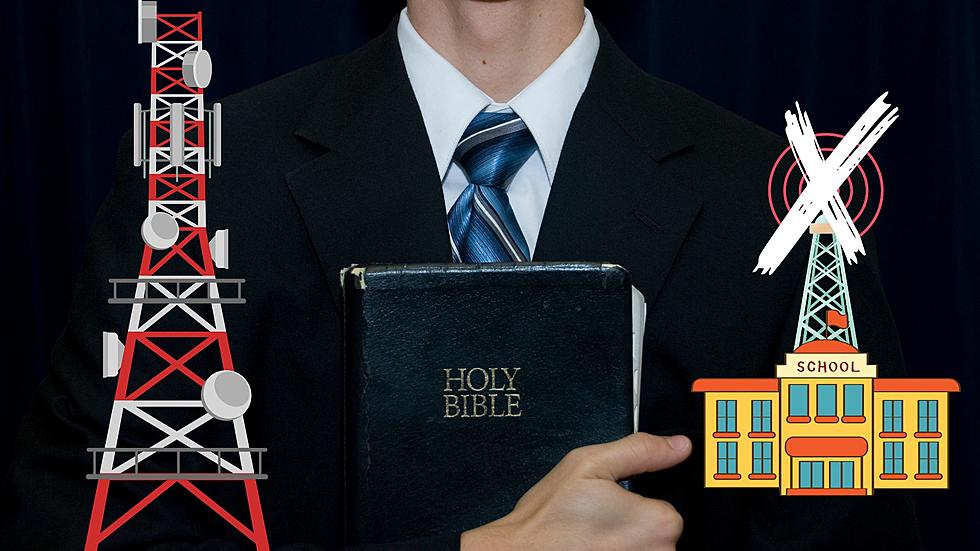
U.P. High School Radio Bullied Off of Frequency By Religious Radio Station
It's not uncommon for small radio stations to change frequencies on the radio dial. More often than not, though, it's a purely business decision, and LOTS of discussions are had between the two competing stations about the change over. It's supposed to take some time.
But that's not the case in the Upper Peninsula for WOAS - a High School Radio station, who was just bullied off of their frequency by a larger faith-based station who is taking over.

WOAS is a very small station. It's only 10 Watts of power, which is barely enough to broadcast around the small town of Ontonagon. In fact, it's run, and operated by Ontonagon High School, and Ken Raisanen, a 69-year-old manager of the student-run studio.
They have been operating on the FM signal of 88.5 since 1978, and while they aren't a HUGE signal in the U.P., they're popular among the students, and supporters of the school, and they serve an important role of broadcasting local events, sports, and public affairs.
But things have changed, and back in July, a bigger name has moved into their lane, and Raisanen wasn't very happy.
"This guy reluctantly sent me an email last April, basically saying, 'Oh, by the way, we bough up your frequency and you're gonna have to find a new frequency.'"
The station moving in is WHWL, which currently operates at 95.7 FM out of Marquette. They are literally a thousand times more powerful than WOAS, with a 10,000 watt transmitter, and 10 translators to extend their broadcast across the U.P. They reach all the way to Sault St. Marie, and a bit of the north tip of the Lower Peninsula, and even creep into lower Canada.
The station describes its format as...
"... a combination of Bible-teaching programs and traditional, conservative music. The blend is a unique one, and has inspired many positive comments from loyal listeners."
Why Are They Taking 88.5?
Two years ago, WHWL applied to the Federal Communications Commission to build two more stations, one of which is in Rockland - right next door to Ontonagon. In February of 2023, they approved the request, granting a license for a new station on 88.5 FM.
Raisanen didn't understand WHY they chose that particular frequency.
"They said, 'By the way, our consultant sent us a list of all these frequencies available for you that you can look at.' I said, 'OK, then why are you taking 88.5? Why, when you sent me all the other frequencies that are available, why that one?'"
The answer he got from WHWL was... "Our consultant says that's the best one for us."
Sadly, WOAS is a Class D station, which isn't protected by other broadcasters. And, it's mostly funded by just two vending machines outside its door in the hallway.
Meanwhile, WHWL is a top-tier, Class A station, owned by the Gospel Opportunities Radio Network, and funded by private donors. Their manager claims he never set out to displace anyone else, but they needed to expand, and were just following the rules set up by the FCC.
Raisanen had something to say about that.
"Ontonagon has this long history of people in boardrooms in far-off places like New York and Cleveland and Boston and Chicago making decisions about the economy here, and it goes on today. It's just a smaller version of that. It's some guy sitting 120 miles away saying, 'Hey, we can take that.' And they did."
What Can WOAS Do Now?
Sadly, a Class D station like WOAS has no say in what happens to them. They're so small, the FCC literally says anyone bigger than them can come in, with no consequences, and take it over.
Raisanen said he had no idea how vulnerable their station was as a Class D broadcaster.
So, for now, they'll look into one of the other frequencies that was suggested to them by the WHWL consultants, but additionally, they put together a fundraiser to buy a new transmitter for the station. It will boost their power from 10 Watts, to 100 Watts, and qualify them for a Class C license, and give them more protections against anything similar happening to them in the future.
"We've got a 45-year legacy, and we'll be back on the air. And hopefully, 45 years from now, they'll be talking about this in historical terms like, 'Hey, remember back when that guy took our frequency?'"


